Power experts have attributed frequent power grid collapses in Nigeria to inadequate investment in modernising and upgrading infrastructure.
They said this in separate interviews with the News Agency of Nigeria (NAN) on Sunday in Lagos.
The experts also emphasised the urgent need for substantial financial commitment to the sector.
National Coordinator of the Coalition for Affordable and Regular Electricity (CARE), Chinedu Bosah, said that the federal government must invest significantly to meet the energy demands of its citizens.
He noted that much of Nigeria’s transmission infrastructure dated back to the 1960s and 1970s, making it outdated and overstretched.
“This lack of investment affects the entire electricity supply chain, from generation to distribution.
“While Nigeria has an installed generation capacity of about 14,000 MW, the country averages only 5,000 MW due to high gas costs, inadequate pipelines and a poorly organised transmission and distribution network,” Bosah explained.
He noted that Nigeria’s energy needs were around 33,000 MW, pointing out that the current installed capacity was far from sufficient.
“Without major investments across the entire value chain, attempts to increase capacity to 8,000 MW or more will likely cause more grid collapses,” he warned.
Bosah called for massive investments to build new power plants, improve gas supply infrastructure and develop renewable energy sources like solar and wind.
He also stressed the need for upgrades in the transmission and distribution networks.
He criticised both the government and private power companies for prioritising profits over infrastructure development, pointing to the imposition of high electricity tariffs on consumers.
“Instead of investing in capacity expansion, they focus on maximising profits through inflated bills.
“The government’s narrative on subsidies is misleading, with high gas prices and electricity tariffs tied to the dollar exchange rate, justifying regular increases and sustaining profits for industry players.
“The recent tariff hikes, including a 234 per cent increase in Band A, are making electricity unaffordable for many Nigerians, worsening the hardships they face,” Bosah added.
Chairman of the Customer Consultative Forum for Festac/Satellite Town, Lagos, Dr Olukayode Akinrolabu, shared similar views.
He said that the country’s federal structure, which limits states’ ability to generate and manage their energy resources, puts extra strain on the national grid.
Akinrolabu described the Transmission Company of Nigeria (TCN) as an “entity” serving elite interests instead of the public.
“We need fresh ideas and leadership to overhaul the system and improve service delivery,” he said.
He urged the federal government to enact laws that allow for state-level independent power generation and encourage a competitive electricity market to attract diverse investors.





